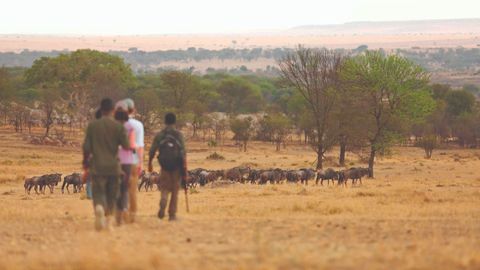
Across the continent, innovators are rethinking everything you thought you knew about heading into the bush—and changing these iconic journeys for the better.

WITH ITS 3D-PRINTED MINI-LODGES and sound baths in the bush—not to mention funding from cofounders of Uber and Tinder— Habitas Namibia (doubles from US$979) is an eco-minded retreat working to turn 50,000 hectares of the Kalahari Desert into a world-class wildlife reserve. It’s a far cry from Out of Africa—which is exactly the point.
In an increasingly woke world, “colonial is like a swear word,” says Caline Williams-Wynn, the South African designer behind some of the buzziest safari-lodge openings in recent years. But as the industry sheds those old-world trappings, there’s still an elephant in the room: “Today, most people who operate safari lodges are not African—or, if they are, they are not black African,” says Fred Swaniker, the Ghanaian founder and CEO of African Leadership University.

“We need black African conservation entrepreneurs who will build the next generation of ecotourism businesses that can create opportunities for our communities.”
ALU graduates will follow black pioneers like African Bush Camps founder Beks Ndlovu, who was born near Zimbabwe’s Hwange National Park. His latest project, Khwai Leadwood (from US$609 per person, all-inclusive), near Botswana’s Moremi Game Reserve, will be the company’s 15th property. “Guests aren’t necessarily going there to tick off the Big Five,” Ndlovu says. “They’re coming to engage with local people and better understand our wilderness areas.”

Meanwhile, South Africa’s oldest black-owned travel firm, Thebe Tourism Group, is turning a historic train in Kruger National Park into Kruger Shalati, reimagining the safari in the very place where it originated. Solar-powered suites will occupy refurbished carriages done up by South African firm Hesse Kleinloog Studio, parked on a bridge overlooking the Sabie River. While the train will remain stationary, guests can ride electric quad bikes along the old rail line and get hands on with a local business-incubation program.

These shifts are promising—but more are needed, says Cameroon-born Lee Litumbe, who founded the Africa-focused travel site Spirited Pursuit. “It’s very rare to see the safari experience told from a black person’s perspective,” Litumbe says. “I think people need to be at the center of their own narrative. It’s empowering.”
Lodge design is also evolving. For many safari-goers today, an aesthetic defined by vintage maps, hunting photos and pith helmets doesn’t necessarily evoke the romance of a long-ago era. “Camps are not what people want anymore,” says Abercrombie & Kent founder Geoffrey Kent, who, incidentally, outfitted the Redford-Streep film that helped spark a generation’s worth of safaris. A&K recently overhauled its original retreat on Kenya’s Mara River, Sanctuary Olonana (from US$535 per person, all-inclusive), replacing old-fashioned tents with 14 glass-walled suites. They’re decorated with commissions from Shelley-Anne Graham, a contemporary South African artist.

Across the border in northern Tanzania, Asilia Africa tapped Williams-Wynn to rethink the brand’s 15-year-old flagship, Sayari (from US$711 per person, all-inclusive). “We’ve literally taken all the canvas off,” she says. The new suites feature handwoven basketwork panels and leather light fixtures that echo the surrounding rock formations. Asilia also added a solar-powered brewery that doubles as a water purification plant, reducing the need for single-use plastic bottles.
At Wilderness Safaris’ Bisate Lodge (from US$1,575 per person, all-inclusive) and the forthcoming Little Bisate, both near Rwanda’s Volcanoes National Park, Williams-Wynn designed thatched villas whose pear shape was inspired by traditional Rwandan architecture. Furnishings are decorated with imigongo, a local craft that combines geometric patterns made from cow dung and paints derived from natural pigments.










